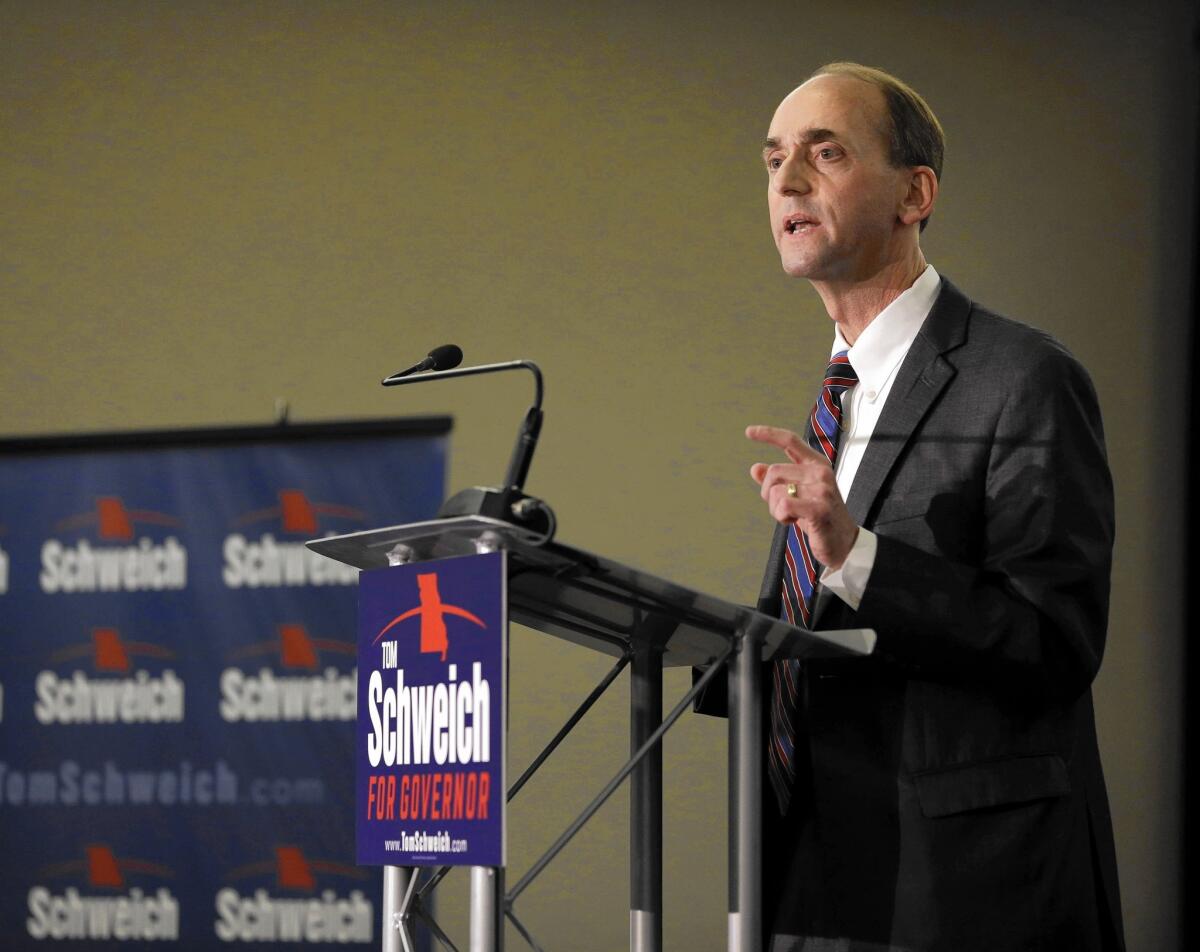Two suicides leave Missouri Republican Party in disarray

When Missouri’s state auditor and Republican gubernatorial hopeful Tom Schweich shot himself in his home in February, his death shattered those close to him.
And by coming at a time he had accused the state party chairman of spreading anti-Semitic whispers about him, Schweich’s suicide has also sent tremors of division through the highest levels of the state’s political class. It set off a wide-ranging debate over whether his suicide resulted from mental health issues kept private and whether it was fed by the state’s vitriolic politics.
The fractured state Republican Party was cleaved anew this week by a similar gunshot suicide by one of Schweich’s top aides. Spence Jackson, a respected and experienced Republican spokesman, left a note saying he couldn’t face being jobless again.
“Within the Republican Party, you have a lot of finger-pointing going on,” says Bill Kenney, the 60-year-old Missouri public service commissioner and a former Republican state Senate floor leader, adding that Schweich’s death and that of his deputy presented a scenario he’d never seen before in politics.
“This is just bizarre,” Kenney said. “Most people are in shock.”
The exact precipitant for the two deaths may never be determined, but, particularly in Schweich’s case, the extenuating circumstances appeared to have been known by many.
Schweich didn’t have the support of the most conservative factions that form the state party’s base. But he did have the backing of Missouri’s more moderate, patrician Republicans, including former U.S. Sen. John C. Danforth.
Schweich’s main opponent in the GOP race for governor was former state House Speaker Catherine Hanaway, the beneficiary of at least $900,000 in donations from conservative St. Louis billionaire Rex Sinquefield. (Such donations are legal in Missouri, which has no limit on contributions or lobbyist gifts.) Although he had a comparatively healthy campaign account, Schweich was so riled by Sinquefield’s donations that he used his gubernatorial announcement to attack the billionaire.
Then came a campaign ad linked to a Hanaway strategist that ridiculed Schweich’s physical appearance.
“Is he a weak candidate for governor?” the ad asked of the slender and balding candidate. “Absolutely, just look at him. He could easily be confused for the deputy chief of Mayberry” — the ever-risible Barney Fife.
A third development seemed to hit Schweich even harder: what he described as a whisper campaign asserting that he was Jewish. Danforth spoke to Schweich two days before the suicide.
“The sole subject of the conversation was the campaign against him,” the former senator said, adding that 90% of the conversation involved Schweich’s concern about anti-Semitic comments.
David Humphreys, a top party donor, would later sign an affidavit saying that he’d heard the state’s new party chairman, John Hancock, referring to Schweich as Jewish and implying “that being Jewish is a negative attribute for Tom Schweich’s gubernatorial race.”
Schweich, who also had blamed Hancock, was not Jewish. Hancock, whose office did not respond to an interview request, has denied running a whisper campaign, although he said he may have told others that Schweich was Jewish before learning he was not. Before he was elected state party chairman, Hancock had worked for Hanaway.
Being identified as Jewish would probably be a liability for a Republican candidate, said Kenneth Warren, professor of political science at St. Louis University. He added that only three Jewish candidates had won statewide office since Missouri’s founding in the 1800s. (One is the current secretary of state, Jason Kander, a Democrat.)
“It has really ripped apart the Republican Party here,” Warren said. “People are buzzing on both sides. They know this can hurt them. They know this is not good for the Republican Party.”
With more than a year until the general election, many Republicans across the state and in the Capitol are trying to lie low.
“They just want a reprieve. They just want time to go by,” said a former Republican legislator still involved in party politics, who would only discuss the sentiments anonymously. “They just want the [legislative] session to be over, they want the year to be over, they just want to go home and heal.... Really, everyone’s demoralized.”
But the campaign itself is proceeding. Hanaway, the front-runner, called the deaths of Schweich and his aide, Jackson, tragic.
“While like all Missourians I mourn the loss of two great public servants, the reasons I am running for governor have not changed,” she said in a written statement. “My experience, ability and positive vision for a better Missouri have not changed. I plan to continue to build upon my grass-roots and donor support and begin to talk to Missourians about solutions to create more quality jobs, better schools and better roads.”
Another possible candidate has recently surfaced: Eric Greitens, a former Navy SEAL and Rhodes scholar who started a nonprofit that provides services to veterans. He is also Jewish.
“I’m proud to be Jewish,” Greitens said in an interview with the Jewish Daily Forward, adding that “the best way to honor the legacy of a person is to support the living.”
GOP state Rep. Kevin Engler knew both Schweich and Jackson. As the state’s fractious Republican Party moves toward the 2016 election, he said, there will be squabbles. But he’s hoping for a more positive tone.
“When tragedies like this happen, it makes people really look at what’s important,” Engler said. “This is just politics and an election. There’s plenty more important.”
Twitter: @mattdpearce
Times staff writer Kurtis Lee in Los Angeles contributed to this report.
More to Read
Get the L.A. Times Politics newsletter
Deeply reported insights into legislation, politics and policy from Sacramento, Washington and beyond. In your inbox three times per week.
You may occasionally receive promotional content from the Los Angeles Times.







